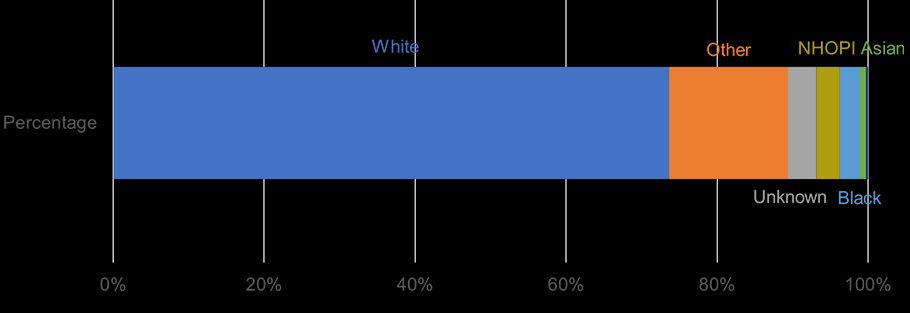State of Washington Uses Hospital Emergency Department Visit Data to Assess Misidentification of American Indian/Alaska Native Persons in Public Health Data
Summary

American Indian/Alaska Native (AI/AN) persons are often misidentified as other races in public health data, underestimating their access to and use of health care and their level of disease burden.
Analysts with the Northwest Tribal Epidemiology Center and the Washington Department of Health compared the Northwest Tribal Registry with nonfederal hospital emergency department (ED) visit data submitted to the state of Washington’s syndromic surveillance program (Rapid Health Information NetwOrk [RHINO]). The Northwest Tribal Registry is a demographic dataset of AI/AN patients registered at Indian Health Service, tribal, and urban Indian clinics in Idaho, Oregon, and Washington state.
Their analysis showed that more than one-quarter of hospital ED visits among AI/AN patients (9,443 of 35,217 total visits) in Washington state may be undercounted due to incorrect or incomplete race information in the patient’s medical record. These findings contribute to the body of knowledge of misidentification of AI/AN persons in health datasets and help show the extent of missing AI/AN race information in health records in Washington state.
Full Story
Public Health Problem
AI/AN persons are often identified as other races in public health data, underestimating their access to and use of health care and their level of disease burden. Probabilistic linkages with tribal registries are an effective tool for addressing underreporting of AI/AN race in surveillance datasets but had not been applied to syndromic surveillance data. In this study, the Northwest Tribal Epidemiology Center and the Washington Department of Health assessed the effect of AI/AN misidentification in nonfederal hospital emergency departments (EDs) in Washington state. They linked the Northwest Tribal Registry with four months of hospital ED visits captured by the state of Washington’s syndromic surveillance program (Rapid Health Information NetwOrk [RHINO]). RHINO is the state of Washington’s source of hospital ED visit data.
Actions Taken
Analysts used Match*Pro record linkage software to conduct a probabilistic linkage between the Northwest Tribal Registry and an extract of personal identifiers for visits from May 15 to September 19, 2020, in Washington’s RHINO system (N = 1,428,289). The Northwest Tribal Registry is a demographic dataset of AI/AN patients registered at Indian Health Service, tribal, and urban Indian clinics in Idaho, Oregon, and Washington (N = 259,281). The datasets were matched using patient name, date of birth, sex, and ZIP Code. After finding matched records between the two datasets, the analysts merged the results with a dataset of de-identified hospital visits from May 15 to September 15, 2020. They analyzed this dataset to assess the effect of incorrect AI/AN information on counts and rates for overall hospital ED visits and visits for selected chief complaint (CC) and discharge diagnosis (DD) categories.
Outcome
The linkage found 9,443 records that matched the tribal registry but had no sign of AI/AN race in the visit record. Most records (73.6%) were originally coded as White (Figure 1). From May 15 to September 15, 2020, missing AI/AN information underestimated the total visit count and rate for AI/AN patients in Washington by 26.8%. The effect on counts for specific CC and DD categories varied. The percent changes in counts due to missing AI/AN information were lower for coronavirus diagnosis (17.6%), COVID-like illness (20.1%), and alcohol-related visits (20.1%) and higher for suicidal ideation (38.8%), traffic-related (42.8%), and disaster-related mental health visits (46.5%).
Figure 1. Distribution of Misidentified AI/AN Records by Original Race Coding

Of the 9,443 records identified as missing American Indian/Alaska Native (AI/AN) information, almost 74% were originally coded as White. About 16% were coded as Other.
Findings show that more than one-quarter of nonfederal hospital ED visits among AI/AN patients in Washington may be undercounted due to incomplete or inaccurate race information in the patient’s medical record. These findings contribute to the body of knowledge of misidentification of AI/AN persons in health datasets and help show the extent of missing AI/AN race information in health records in Washington state.
Contact
Sujata Joshi
Northwest Tribal Epidemiology Center
Northwest Portland Area Indian Health Board
Improving Data & Enhancing Access (IDEA-NW)
Email: [email protected]
Rapid Health Information Network (RHINO)
Washington State Department of Health
[email protected] (or [email protected])
Centers for Disease Control and Prevention
Office of Public Health Data, Surveillance, and Technology
Division of Health Informatics and Surveillance
www.cdc.gov/nssp
This piece was republished from the CDC.